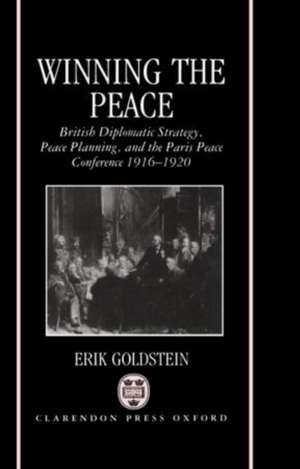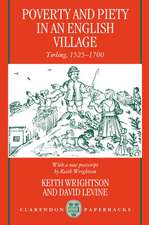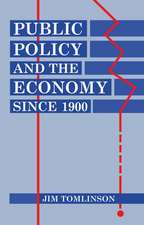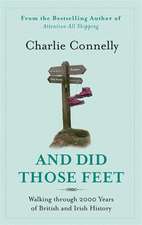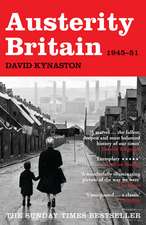Winning the Peace: British Diplomatic Strategy, Peace Planning, and the Paris Peace Conference 1916-1920
Autor Erik Goldsteinen Limba Engleză Hardback – 29 mai 1991
Preț: 759.59 lei
Preț vechi: 1152.08 lei
-34% Nou
Puncte Express: 1139
Preț estimativ în valută:
145.35€ • 155.43$ • 121.19£
145.35€ • 155.43$ • 121.19£
Carte tipărită la comandă
Livrare economică 07-12 aprilie
Preluare comenzi: 021 569.72.76
Specificații
ISBN-13: 9780198215844
ISBN-10: 0198215843
Pagini: 328
Ilustrații: 3 maps, 1 figure
Dimensiuni: 143 x 223 x 24 mm
Greutate: 0.55 kg
Editura: Clarendon Press
Colecția Clarendon Press
Locul publicării:Oxford, United Kingdom
ISBN-10: 0198215843
Pagini: 328
Ilustrații: 3 maps, 1 figure
Dimensiuni: 143 x 223 x 24 mm
Greutate: 0.55 kg
Editura: Clarendon Press
Colecția Clarendon Press
Locul publicării:Oxford, United Kingdom
Recenzii
`The book is a rewarding and dense study of the subject, particularly good for its analysis of minor novelists, both of the early part of the century, and its end.^'Irish Independent
` ... this is a worthy contribution to the history of the Foreign Office.'David Longley, History
`...his chapter on the formation of the Political Intelligence Department is particularly illuminating, and adds substantially to P.M. Taylor's earlier work on the subject. ...This is both a good and an important book. Goldstein's research is meticulous, his organization sensible, his judgements sound and his conclusions judicious. The topic is a valuable one, ...'Keith Neilson, Canadian Journal of History
'This is a full and useful account, well and widely researched. It breaks important new ground.'A. Lentin, The Open University, Diplomacy & Statecraft, Vol. 3, No.3, Nov '92
'This is an engaging book, elegantly written, and with enough fresh information to keep the reader turning the pages eagerly.'George Egerton, University of British Columbia, Albion, Winter '92
'Goldstein's study shows how comprehensively the challenge of peace was viewed in Britain, as elsewhere, at the end of the First World War.'Leo Haupts, University of Cologne, German Historical Institute London Bulletin, Volume XV, No. 2, May 1993
'The net effect is that of bringing out fresh highlights in an existing tapestry without much altering its familiar features and overall design ... informative book.'D.N. Lammers, Michigan State University, American Historical Review
'The book ... is full of carefully studied generalizations about a wide range of European and imperial problems of peacemaking from the British perspective. It is impressively researched and, given its subject, presented with remarkable clarity ... it will become a standard work among diplomatic historians.'James D. Stuart, Valparaiso University, The Historian, Vol. 55, No. 4, Summer '93
'well-documented and ably argued book'Trevor Wilson, University of Adelaide, The International History Review, XVI:I:February 1994
` ... this is a worthy contribution to the history of the Foreign Office.'David Longley, History
`...his chapter on the formation of the Political Intelligence Department is particularly illuminating, and adds substantially to P.M. Taylor's earlier work on the subject. ...This is both a good and an important book. Goldstein's research is meticulous, his organization sensible, his judgements sound and his conclusions judicious. The topic is a valuable one, ...'Keith Neilson, Canadian Journal of History
'This is a full and useful account, well and widely researched. It breaks important new ground.'A. Lentin, The Open University, Diplomacy & Statecraft, Vol. 3, No.3, Nov '92
'This is an engaging book, elegantly written, and with enough fresh information to keep the reader turning the pages eagerly.'George Egerton, University of British Columbia, Albion, Winter '92
'Goldstein's study shows how comprehensively the challenge of peace was viewed in Britain, as elsewhere, at the end of the First World War.'Leo Haupts, University of Cologne, German Historical Institute London Bulletin, Volume XV, No. 2, May 1993
'The net effect is that of bringing out fresh highlights in an existing tapestry without much altering its familiar features and overall design ... informative book.'D.N. Lammers, Michigan State University, American Historical Review
'The book ... is full of carefully studied generalizations about a wide range of European and imperial problems of peacemaking from the British perspective. It is impressively researched and, given its subject, presented with remarkable clarity ... it will become a standard work among diplomatic historians.'James D. Stuart, Valparaiso University, The Historian, Vol. 55, No. 4, Summer '93
'well-documented and ably argued book'Trevor Wilson, University of Adelaide, The International History Review, XVI:I:February 1994
